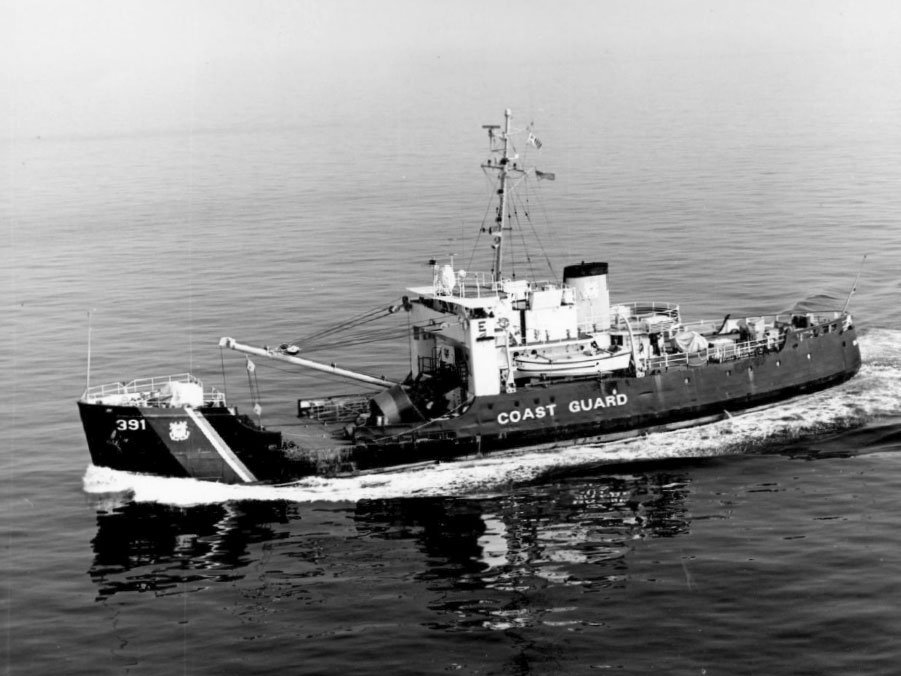There is no greater love than to lay down one’s life for one’s friends.
John 15:13, New Testament
In the long history of the U.S. Coast Guard, there is no better example of the Biblical scripture listed above than the case of “Billy” Flores. In 1979, less than a year out of boot camp, a quiet and unassuming young man came aboard the buoy tender Blackthorn (WLB-391). The 19-year-old seaman apprentice had graduated from the Coast Guard Training Center at Alameda, California. Born and raised in Carlsbad, New Mexico, his parents gave the young man permission to leave high school early to enlist in the United States Coast Guard. His name was William Ray “Billy” Flores.

One of forty 180-foot buoy tenders built during World War II, Blackthorn was commissioned in 1944. Like the rest of the service’s aging fleet, Blackthorn underwent numerous overhauls during its lengthy career. From late 1979 through early 1980, Blackthorn received yet another overhaul—this time in Tampa, Florida. In late January, after completing its overhaul, Blackthorn prepared for the voyage back to its homeport of Galveston, Texas.
Blackthorn began its journey on the night of Monday, Jan. 28, 1980. While the tender steamed down the shipping channel near the mouth of Tampa Bay, the 600-foot tanker S.S. Capricorn was steaming into the bay. Having been overtaken by the Russian passenger ship Kazakhstan, Blackthorn proceeded in mid-channel. Glare from the brightly lit passenger vessel prevented the bridge watches of Blackthorn and Capricorn from seeing each other at first. After regaining its bearings, Capricorn began to turn left, but this prevented the two ships from passing port-side to port-side. Unable to make radio contact with Blackthorn, Capricorn’s pilot blew two whistle blasts to signal that the ships pass starboard-to-starboard.
With Blackthorn’s officer-on-deck, Lt. Cmdr. John Ryan, confused about standard operating procedure, the tender’s skipper ordered evasive action. But the order came too late, and the ships collided. The damage to Blackthorn seemed minimal at first, but Capricorn’s anchor had imbedded in the tender’s hull and, as the ships began to separate, the slack in the anchor chain tightened. When the chain became taught, the anchor ripped open the tender’s port side filling Blackthorn’s exposed compartments with water. The buoy tender soon began a roll onto its port side.
As Blackthorn began to capsize. A 1980 photograph of Blackthorn after its raising for inspection and subsequent sinking as a reef. In the darkness, Seaman Apprentice Flores and a shipmate located the lifejacket locker. They threw lifejackets to crewmembers already in the water and Flores used his trouser belt to hold open the locker door and allow more to float to the surface. After most of the survivors had abandoned ship, Flores stayed with the sinking tender determined to save more shipmates trapped in the sinking hull. In his selfless effort to save more lives, Flores sacrificed his own life. As if given the gift of life by Flores, later recounted, “As I struggled, suddenly a life jacket from the locker that was on the main deck came floating up to me.”
Even though the sinking resulted in the death of Flores and 22 of his shipmates, many more would have died if not for his heroic efforts. After the accident, the lost buoy tender was re-floated for a subsequent investigation and board of inquiry. Blackthorn was then sunk as an artificial reef in the Gulf of Mexico. A monument was later erected in memory of the Blackthorn in St. Petersburg, Florida, where annual commemorations are observed on the date of the tender’s loss.
In the years after Blackthorn’s sinking, surviving crewmembers who witnessed Flores’s bravery, lobbied the service to recognize and honor their fallen shipmate. Flores’s shipmates gathered records and eyewitness accounts to ensure that he was duly recognized for his self-sacrifice and devotion to duty. In September 2000, William Flores’ family accepted from the service the posthumous award of the Coast Guard Medal, the service’s highest award for peacetime heroism. The medal citation reads:
The President of the United States of America takes pride in presenting the Coast Guard Medal (Posthumously) to Seaman Apprentice William R. Flores, United States Coast Guard, for heroism.


